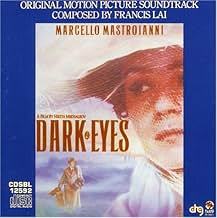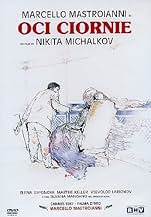IMDb RATING
7.3/10
3.7K
YOUR RATING
An Italian tells his story of love to a Russian. In a series of flashbacks, Romano Patroni leaves his wife to visit a spa where he falls in love with a Russian woman. He returns to Italy res... Read allAn Italian tells his story of love to a Russian. In a series of flashbacks, Romano Patroni leaves his wife to visit a spa where he falls in love with a Russian woman. He returns to Italy resolved to leave his wife and marry his love.An Italian tells his story of love to a Russian. In a series of flashbacks, Romano Patroni leaves his wife to visit a spa where he falls in love with a Russian woman. He returns to Italy resolved to leave his wife and marry his love.
- Nominated for 1 Oscar
- 12 wins & 22 nominations total
Elena Safonova
- Anna Sergeyevna, Governor's Wife
- (as Elena Sofonova)
Innokentiy Smoktunovskiy
- Il Governarore di Sisoev
- (as Innochentij Smoktunovskj)
Yuriy Bogatyryov
- Il Maresciallo
- (as Jury Bogatiriov)
Dmitriy Zolotukhin
- Konstantin
- (as Dimitri Zolothuchin)
Jean-Pierre Bardos
- Ospite sdraiato
- (as J. Pierre Bardos)
Elguja Burduli
- Il cuoco della nave
- (as Elgugia Burduli)
Pierluigi Cervetti
- Il maestro di ginnastica
- (as P. Luigi Cervetti)
Featured reviews
Based (loosely) on Chekhov's story "The Lady With The Little Dog," Oci Ciornie (Dark Eyes) features some of the most sumptuous photography of recent years. Set in Yalta, a sultry Black Sea spa for stylish Russian idlers, Dark eyes features a memorable tragic-comic performance by Marcello Mastroianni as Romano, foolish, gallant, ultimately trivial, and a superbly innocent, deeply moving performance by Yelena Safonova as the woman whom he utterly, shamefully fails. Mikhalkov's script departs from the Chekhov story in ways that some Chiekhov-loving viewers might balk at. But Chekhov's ending is perhaps too subtle and introspective for cinematic realization, and Mikhalkov's alternative, seems justified, if only as a vehicle for Matroianni's extraordinary performance.
At first it seemed a terribly slow start. This was exacerbated by our mistaken notion that "Oci Ciornie" was just another title for "Urga" - we kept wondering when and how they would ever get to Mongolia in that boat!
However, once we'd determined the actual story line the dilatory beginning seemed somehow apropos. Did Mikhalkov really mean to show us the emptiness of adultery? Or is he just an astute observer of the human condition? The parallels to the 1960 B&W "Lady with the Dog" (Russian) were striking. Especially the watermelon scene. But "Dark Eyes" takes the story further and carries the theme to its logical conclusion. My daughters hated it - they prefer stories of fidelity. But I did think it was refreshing for a film to come nearer the truth for a change. Adultery is not that fulfilling.
However, once we'd determined the actual story line the dilatory beginning seemed somehow apropos. Did Mikhalkov really mean to show us the emptiness of adultery? Or is he just an astute observer of the human condition? The parallels to the 1960 B&W "Lady with the Dog" (Russian) were striking. Especially the watermelon scene. But "Dark Eyes" takes the story further and carries the theme to its logical conclusion. My daughters hated it - they prefer stories of fidelity. But I did think it was refreshing for a film to come nearer the truth for a change. Adultery is not that fulfilling.
Yes, its story is an old chestnut. There's an excuse for Marcello Mastroianni to tell a story about himself and a Russian woman, and he does it, and there's an aftermath. But the story is so good and so well told (and acted and directed) that the device is like an old friend. This is one of Mikhailkov's best, right up there with Burnt by the Sun. It draws on Heifetz's Lady with a Dog (and Chekhov's short story too, for that matter) and parodies (or pays homage to) Fellini's 8 1/2--both just right for this Italo-Russian piece about Italians and Russians, which I found a pure delight. It revels in both poking fun of and warmly enjoying both Italian and Russian types and moods. For me, there was the additional pleasure of seeing Innokenti Smoktunovsky, who played the title role in Kozintsev's Hamlet, now middle-aged and as fine an actor as ever. Will it ever be released on DVD? It's about time this one is rediscovered.
I consider this movie a masterpiece. The performance of Marcello Mastroianni is simply sublime, one of the best I have ever seen from anyone, anywhere. Yes, the surface plot is about adultery, but the story is much more than that. I think this is a story about a man, an old man near the end of his life, looking back on his playboy, vagabond, good-for-nothing life, regretting it, but not knowing any other way to live. "Mother's lullaby and the Russian mist" is all he remembers about his own life, he says. Watch this old man cry, and it stirs you with all kinds of emotions and thoughts, makes you think about how you should live, that tragedy happens everyday, to every small man who must fend for himself and fail. You tell yourself you will never be like him, you pity him, disrespect him, despise him, but in the end you understand this man in the most profound sense. And you will never be able to forget that Russian mist either. Superb.
There are many wondrous qualities to this movie, especially the performance of Marcello Mastroianni. I only want to mention one scene, my favorite. It occurs when Romano (Mastroianni) arrives by train in the Russian village of Sisoev where he is to set up a glass factory.
Upon de-training all he sees is a peasant woman with a cow. Suddenly, on the other side of the tracks a band plays. Romano walks across the welcome-carpet to a crowd of townspeople giving him a raucous reception. Actually folks here want the factory for themselves . The Italian is offered Russian bread to sample. Young girls bear doves and present the man with wreaths. The mayor recites a poem and gives a welcome speech. A medal is bestowed. Kisses galore are planted.
Singers and balalaika players appear. Caviar and lethal vodka is thrust upon the man, who is barely able to cope with its potency. It's a distillation (pun intended) of Russian-ness which overwhelms the guest as he is conducted by carriage to his hotel and carried in, tired and soused, later muttering "Sabatchka," the name of the little dog belonging to Anna, the Russian girl that has aroused his passion. Great, great!
Upon de-training all he sees is a peasant woman with a cow. Suddenly, on the other side of the tracks a band plays. Romano walks across the welcome-carpet to a crowd of townspeople giving him a raucous reception. Actually folks here want the factory for themselves . The Italian is offered Russian bread to sample. Young girls bear doves and present the man with wreaths. The mayor recites a poem and gives a welcome speech. A medal is bestowed. Kisses galore are planted.
Singers and balalaika players appear. Caviar and lethal vodka is thrust upon the man, who is barely able to cope with its potency. It's a distillation (pun intended) of Russian-ness which overwhelms the guest as he is conducted by carriage to his hotel and carried in, tired and soused, later muttering "Sabatchka," the name of the little dog belonging to Anna, the Russian girl that has aroused his passion. Great, great!
Did you know
- TriviaFinal film of Silvana Mangano.
- SoundtracksSonata per pianoforte n. 17 in Si bemolle maggiore, K. 570
Composed by Wolfgang Amadeus Mozart
Performed by Laurent Ferlet
- How long is Dark Eyes?Powered by Alexa
Details
Box office
- Gross US & Canada
- $2,201,428
- Gross worldwide
- $2,201,428
- Runtime
- 1h 58m(118 min)
- Color
- Sound mix
- Aspect ratio
- 1.85 : 1
Contribute to this page
Suggest an edit or add missing content
































